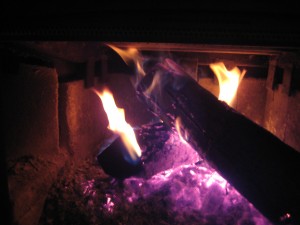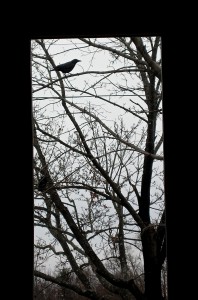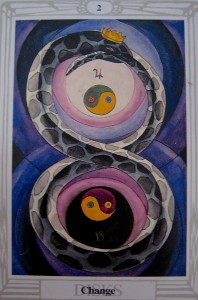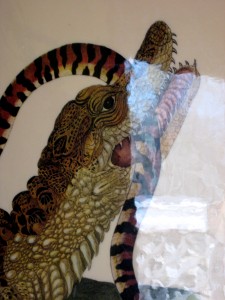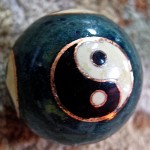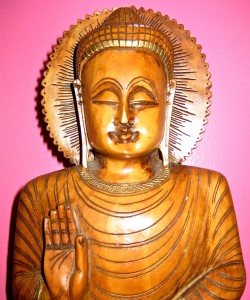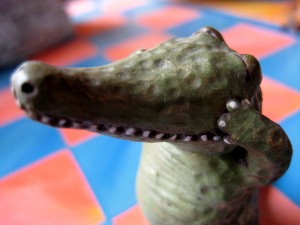
Leonard Cohen sings: I had to go crazy to love you, had to go down to the pit, had to do time in the tower, begging my crazy to quit…Had to go crazy to love you, had to let everything fall, had to be people I hated, had to be no one at all…
I’m a Leonard Cohen fan, have been ever since I first saw him perform in Gothenburg, Sweden in 1976. It was just him and his guitar. He sat alone on a folding chair on the stage, a cup of something at his feet. He touched the poet in me and I recognized his agony. Since then he’s spent time as a monk, but he’s also perfected his outer persona and through many trials and errors become the consummate performer, giving his all, even at the age of 78 performing for three hours to packed houses.
I still hear his agony in his songs, recognize the imperfect human creature he presents us with. And this song, Crazy To Love You, is all about that. It’s about projection and facing the self, doing the recapitulation time, going down into the shadows of the self, ascending into the inflations of the self, confronting everything hateful about the self, becoming nothing—egoless—and in the process learning to love the self. It’s all about taking the endless contemplative inner journey and not giving up, no matter what is encountered. It’s about seeking a kind of perfection, a humble impeccability that knows that everything is okay, everything is necessary and permissible, everything leads to love. When we acquiesce to our humanness we discover that our greatest challenge in life is to love the self. If we can love the self, then we’re on the way to honing a new kind of impeccability devoid of self-importance, the impeccability of being able to love others, to being able to embrace all humanity as being as imperfect and as lovable as we are. We all have to go crazy to love one another.
Recently I dreamed a dream of deep encounters with the self. I sat with Chuck and many hundreds of others at a huge banquet table, perhaps a hundred feet long and a dozen feet wide. Perhaps you were all there as well. We were all under the control of a tiny woman who stood opposite me at the far end of the table. From my position I could see that she was tiny, but her voice was booming, commanding, and her image, projected onto a giant screen above her, loomed over us, making her seem bigger than life, more frightening than she appeared in person.
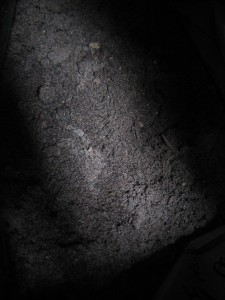
She made demands, gave us absurd and demeaning challenges. Like a dictator, she barked out commands, telling us what to do as she timed us, and then punished us for not completing our tasks within the time limitations she had set. At one point, she told us all to take a shit, right at the table. We were only given so much time and so much toilet paper. I failed this test. I fumbled with the paper, and by the time the few seconds she’d given us had passed I was in deep doo-doo, so to speak. From then on I had to walk around with shit in my pants.
After the table scene ended we had to hike through some fields. It was dark. We were heading to a big bonfire. We were commanded to bring our most valuable possessions with us, packed in small glass jars and wooden boxes. I told Chuck that if she instructed us to “go into the woods,” that I wasn’t going. I was adamant about that, a clear reference to my abuse. “Oh yeah,” Chuck said, and I could hear him trying to figure out a way to tell this little tyrant woman that I would not go into the woods and be humiliated, that I was done with that. We knew she was unapproachable, that she wouldn’t care and that no excuses would be accepted. It didn’t matter what you had been through in your past, she was not going to let anyone off the hook. Feeling sorry for anyone was not allowed. It was expected that every experience would be confronted if she deemed it necessary. She demanded that we erase all personal attachment and self-importance, and humiliation was as good a means of getting us there as any.
We finally got to the site of the bonfire. The little woman told us all to throw our most valuable belongings into the fire. “Do you think it’s a good idea to throw glass jars into a hot fire?” I asked Chuck, but it didn’t matter. “Just do it!” the woman screamed. We all tossed our things onto the fire and stood around watching them burn. I woke up as she came over to me, looked me straight in the eye, and then turned her back and walked away. “Fuck you,” I thought.
Upon awakening, it didn’t take me long to see this dream as confrontations with habits, with the mindless things we do and how they control us. Obviously, it’s also about self-importance. The little woman was me, a part of me that sets me up to do as I have always done, keeping me a prisoner of my own doings, as I clearly felt like a prisoner in the dream. And if you were there, you were a prisoner too. “Had to go down to the pit,” as Leonard Cohen writes, had to sit in my own shit.
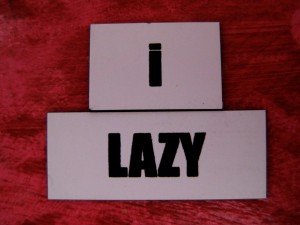
We all have a little petty tyrant inside of us, someone who humiliates us and whom we hate. We feel trapped and helpless. It could be related to anything: to constant worry or fear, to overspending or over-consuming, to being too hard or too easy on ourselves or lazy and undisciplined. It could be attached to being angry all the time or sad all the time, full of self-righteousness or self-pity, things that really get us nowhere.
Our personal petty tyrant knows us so well. She knows how to slip in and take over, how to humiliate us and make us face our shit. In my dream, the tiny woman pushed us all to be something we hated and “no one at all.” In the burning of what was most precious, she forced us to let go of everything, of both our shame and our self-importance. I was nothing more than a woman walking around with shit in my pants, my possessions gone. Had to go into the fire and let it all burn.
In this dream, my petty tyrant, whom I so viscerally hated, became my guide, and so I have to love her. She is the knowing part of myself, leading me to the naked truth that I am nothing at all, and only in that place of naked truth can I love myself. As Leonard Cohen learned: Had to go crazy to love you! In recapitulation, we discover that going into the pit means accepting everything about ourselves; even the shit in our pants must not be attached to. Even the implication of my abuse must not be more important than anything, than nothing. “Don’t get attached to anything, Jan,” this tiny petty tyrant self is saying in this dream.
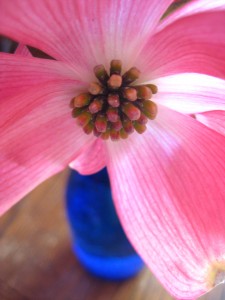
Everything is of the same value and everything has no value. There is no point in shame or anger, in self-pity or specialness. The only thing that really has value is pushing the self every day to keep going—just as this tiny woman dictator did—to keep confronting the self, to keep shedding attachments to what we think we need and want. In the end, although I said “Fuck You,” I was really thanking her for helping me face myself, for emptying out. Because by the end of the dream that was what I felt, empty, light, bereft, as if something had died, but bereft in a good and cleansing way. It was as if I had finally let something go that had been bothering me for a long time, and I know that it was my own attachment to feeling that I had to be perfect all the time. How absurd!
I hope this makes sense. Our struggle is to really let go of self-importance by facing our most private and intimate self, and fully accepting that we are all really nothing at all. I find such release in knowing that I am nothing. I’m able to relax into who I truly am, offered the freedom to live without fear and without the need to always get it right. For it’s in our failures that we learn, it’s in facing our shit that we evolve.
Going on, shamelessly facing myself, living in the moment, without attachment. Thanks for reading!
In all humility,
Jan
Many thanks to Leonard Cohen for a lifetime of beautiful work!
And without self-importance—because I really do reveal my most intimate self in my books—here’s a shameless plug for my new book. It’s really a good read! The book icon in the left sidebar leads directly to Amazon. I’m working on getting the Kindle edition linked to the main book page, so you should find it there shortly.

